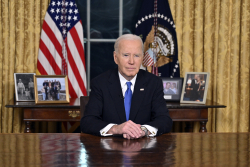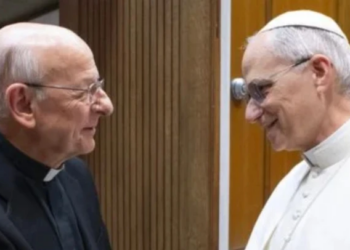Trump’s OMB Director Russell Vought needs more of an global health, aid, and disaster relief agenda than just spending cuts.
When it comes to American national security, foreign aid has, more often than not, been treated as a kind of poor stepchild. Conservative lawmakers ranging from former Senator Jesse Helms to current Senator Rand Paul (R-KY) have inveighed against it. At the same time, economists such as PT Bauer have shown that big state development projects often produce political corruption rather than economic growth. However, the Trump administration has taken skepticism about foreign assistance to new heights with its withdrawal from the World Health Organization, not to mention its abolition, in the space of a few weeks of USAID.
Now, in its new proposed FY 2026 budget, the Trump administration is proposing further cuts. In a letter sent to Senator Susan Collins (R-ME) on May 2, Office of Management and Budget Director Russ Vought declares that he and his associates have eliminated spending “contrary to the needs of ordinary working Americans and tilted toward funding niche non-governmental organizations and institutions of higher education committed to radical gender and climate ideologies antithetical to the American way of life.”
What the way of life is is what Vought does not say. However, it apparently does not include much support for global health—the budget proposes billions in cuts overall, including in the areas of international humanitarian disaster relief and international development.
The main innovation that it suggests is the establishment of an “American First Opportunity Fund.” This fund would be vouchsafed a grant of $3 billion for bilateral economic assistance. How its funds would be disbursed—or to whom—is unclear. Is there a viable new model for assistance?
On Friday, I attended a fascinating conference at the Harvard Club in New York organized by Jennifer Brick Murtazashvili (the founding director of the University of Pittsburgh’s Center for Governance and Markets), which explored just that question. Murtazashvili has lived and worked in Central Asia and is the author of several books, including Informal Order and the State in Afghanistan.
She believes that the Trump administration provides a vital chance to rethink the vexed question of foreign aid. “Everything is on the table,” she told me. “We have a great opportunity to reimagine everything. As the Trump administration stated, aid isn’t going away. We have a unique opportunity. I don’t think we would have anyone in Washington to say that it was going great under Biden. Aid was dysfunctional.”
Murtazashvili’s optimism proved infectious. She gathered a group of leading entrepreneurs, academics, think-tank fellows, and journalists to take a fresh look at foreign assistance. Melinda Haring, a nonresident senior fellow at the Atlantic Council, explained that “the Trump administration is obliterating U.S. foreign assistance which is traumatic but gives us an opportunity to revitalize old cold war institutions that were largely archaic and ineffective.”
The attendees examined a variety of innovative approaches that could be adopted, ranging from employing AI or Blockchain to create greater transparency about the flow of funds to establishing tariff-free zones. Throughout, the challenge from China, which is pursuing, as far as possible, the expansion of its softer power, whether in Central and South America or Africa, loomed large. The bottom line was clear: simply clinging to an older conception of economic and humanitarian aid is a nonstarter.
The Trump administration is bound to come under mounting pressure to make good on its vow to reboot foreign aid. A new poll indicates that three-quarters of Christian evangelicals are apprehensive about Trump’s proposed foreign assistance cuts. Congress, too, is wary of some of the more sweeping cuts outlined by the administration. Senator Susan Collins, for example, has indicated that she would be unlikely to back cutting PEPFAR, a program that battles HIV/AIDS abroad. As the Governance and Markets conference underscored, the battle over the future of foreign assistance has not ended. It has only begun.
About the Author: Jacob Heilbrunn
Jacob Heilbrunn is editor of The National Interest and is a nonresident senior fellow at the Atlantic Council’s Eurasia Center. He has written on both foreign and domestic issues for numerous publications, including The New York Times, The Washington Post, The Wall Street Journal, Financial Times, Foreign Affairs, Reuters, Washington Monthly, and The Weekly Standard. He has also written for German publications such as Cicero, Frankfurter Allgemeine Zeitung, and Der Tagesspiegel.
Image: Maxim Elramsisy / Shutterstock.com.


















